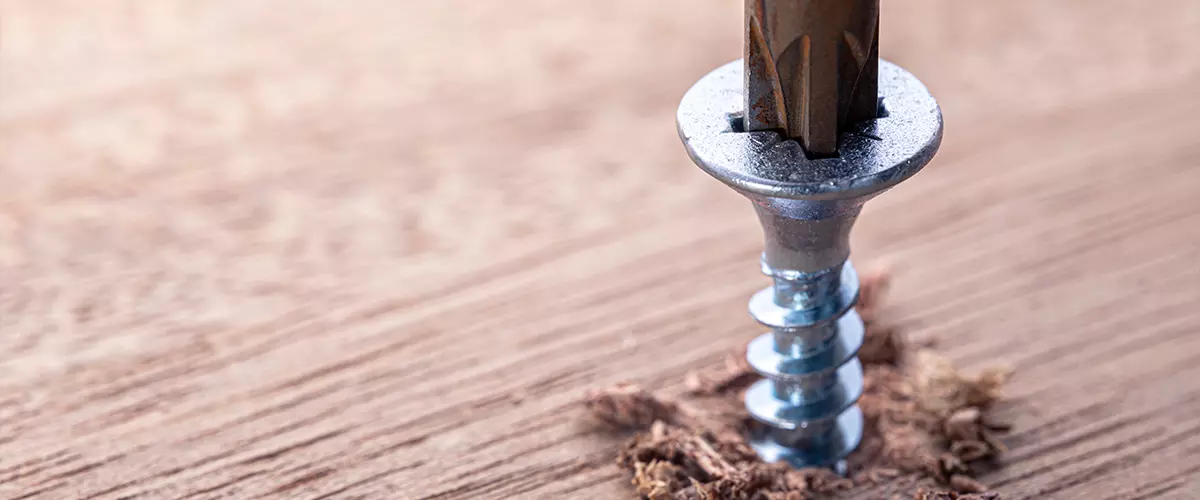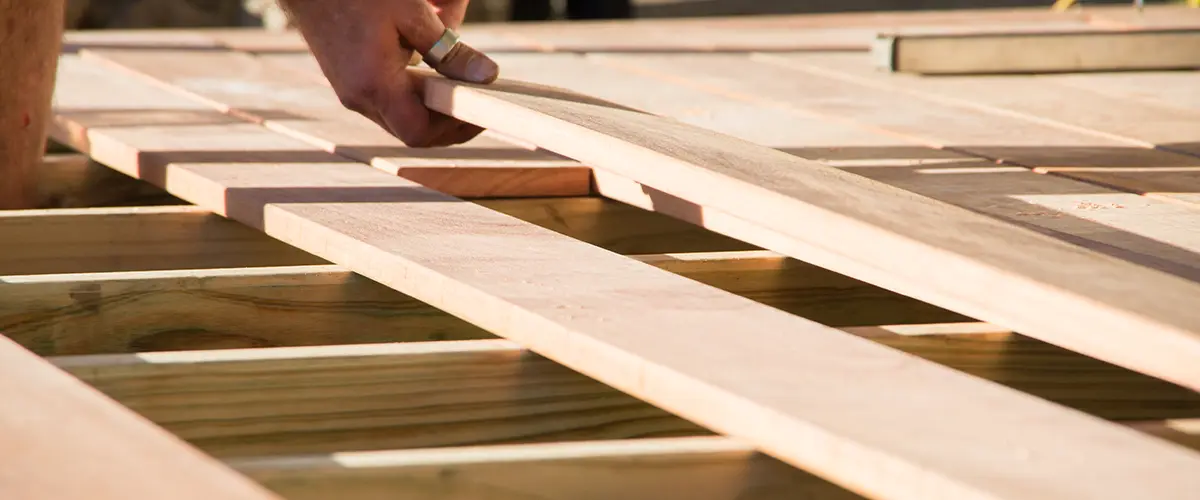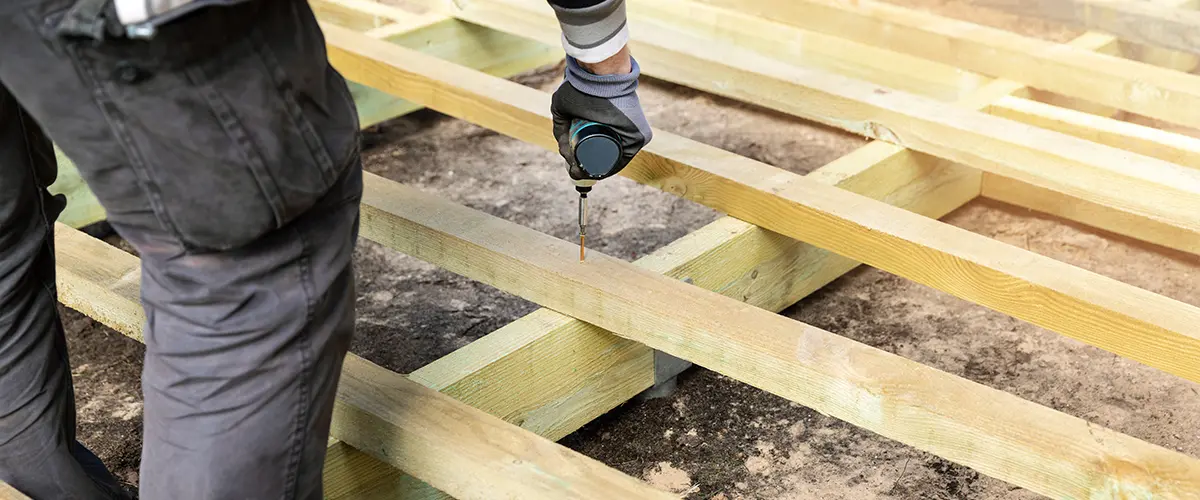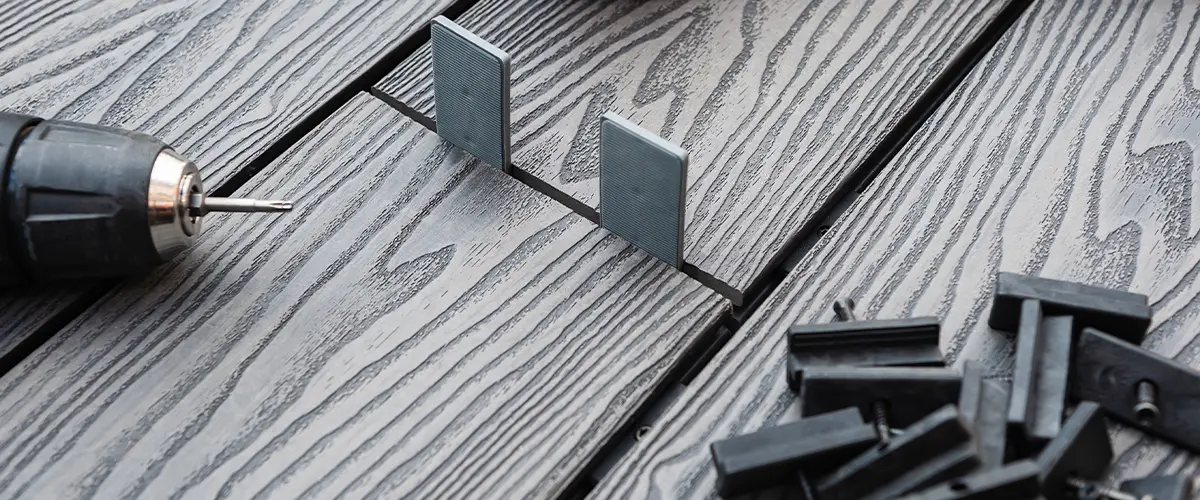Are you debating whether to use screws or nails for your decking project? Have you researched but still can’t decide which fastener is right for your needs? When building a safe and durable deck, it’s important to understand the advantages and disadvantages of both screw and nail installations.
This blog post explains the pros and cons of each fastening method so you can make an informed decision about what’s best for your home improvement project. Worry no more – get all the information here before starting on your deck. Get ready to find out how to create a strong, reliable, long-lasting deck that fits in with any outdoor décor.

Key Takeaways
- Screws offer enhanced holding power for decking compared to nails. They have superior tensile strength, maintain a tight grip over time, and are less likely to loosen or pop out.
- Nails provide quick and easy installation for decking projects. They are cost-effective and suitable for tight schedules or budgets.
- Screws require pre-drilling to prevent wood splitting and ensure a secure connection. Using a drill with a screwdriver bit is recommended for sinking screws deeper into the board.
- While screws may be more expensive than nails, they offer structural strength, enhanced holding power, and superior corrosion resistance. Investing in quality deck screws can be worth the extra cost.
- When choosing between screws and nails, consider factors such as stability, cost, longevity, and the specific requirements of your decking project. Proper installation is crucial for a safe and durable deck.
Pros and Cons of Screws for Decking
Enhanced holding power
Screws offer exceptionally strong holding power when decking compared to nails, making them preferred by many. The tensile strength of screws makes them far superior in terms of fastening materials, such as deck boards and joists, ensuring the stability and durability of the deck frame.
Furthermore, while nails have a tendency to loosen over time due to their more brittle material composition, screws can maintain a tight grip that will last for years. This is because of their ringed shafts, which provide flexibility in addition to gripping power when affixed to surface areas between two pieces.
This combined feature makes them highly effective at keeping something secure versus what would be otherwise lost with a nail.
As an added bonus, they require less effort during installation since pre-drilling isn’t normally required, thus reducing chances for errors during construction for DIYers or contractors alike.
Less likely to pop out
When it comes to decking, screws are significantly less likely to pop out of place compared to nails. Screws offer a more secure and reliable connection than nails because they are thicker than nails and engage the material as they turn.
This helps provide extra hold for different materials like pressure-treated lumber, composite boards, or wood decking boards. The tight and steady hold that the screws create helps ensure that your outdoor project stays stable over time without needing tedious maintenance work.
Additionally, using longer deck screws will further prevent popping out in wet conditions by anchoring into a solid surface such as concrete footing or joists deeper below the wood’s surface.
Residential homebuilders often opt for coated deck screws due to their corrosion resistance properties which makes them able to withstand harsh weather conditions better than regular steel fasteners like nails.
Requires pre-drilling
Pre-drilling is essential when using screws for decking. This process prevents wood from splitting and ensures a secure connection between the screw and the wood. Failure to pre-drill can result in weakened fastenings, poor connections that are more prone to failure, and even damage to the deck boards or framing material.
In addition, it’s important to use a drill with a screwdriver bit as this will realistically sink screws deeper into the board than an ordinary electric drill or manual driver would.
If possible, pre-drilling pilot holes of 1/4 inch allow for easier insertion of deck screws without producing too much friction on the screw shank and improve overall corrosion resistance.
Can be more expensive
Screws tend to be more costly than nails when it comes to decking, but they offer a range of advantages that make them well worth the extra investment. Structural strength and enhanced holding power are two of the main benefits screws bring to the table, which can be particularly important for large projects such as framing decks or installing composite materials.
Additionally, screw fastening is also less likely to pop out over time due to its increased tensile strength and superior corrosion resistance compared with nails. While pre-drilling may be necessary for some types of wood or project size, this is usually not an issue, given how strong the hold will generally be with screw fasteners.
Therefore, although investing in quality deck screws might mean an additional cost upfront, there is the excellent value associated with these sturdy fixings that go into making your finished space look beautiful and last longer, no matter what elements it’s exposed to over time.

Pros and Cons of Nails for Decking
Quick and easy installation
Nails are a popular choice for decking projects due to their speedy and cost-effective advantages. Nail installation requires minimal preparation, with even unskilled handymen being able to install them quickly.
Unlike screwing in each board one at a time, nailing boards can be accomplished rapidly. This makes nail installation suitable for those running on a tight schedule or budget as they take less effort and tools such as pre-drilling are not required.
For example, ring-shank nails can easily be driven deep enough into the wood materials of the deck, ensuring they will stay secure over time. Furthermore, certain specialized types of coated galvanized nails offer weather resistance from rain or snow, providing added protection against corrosion over other fastening methods such as screws or staples.
May pop out over time
Nails may not be the best choice for decking due to their lack of grip strength and potential for popping out over time. This lack of secure holding power can lead to loose boards and cause significant damage, which is why screws are generally preferred when constructing a deck.
A popped nail may rip socks or mar the overall aesthetic appearance of the deck, all while detracting from its stability and longevity. Not only that, but an unsafe condition could develop if nails come loose over time, becoming hazardous especially to children playing in or around your newly built outdoor living area.
In addition to this risk posed by nails, they also require more skill during installation in terms of placing them correctly so they will stay put – something needed less with screws thanks to their superior gripping action.
Less holding power
More affordable
Nails are a cost-effective fastening method for decking projects. A one-pound box of tenpenny three-inch galvanized nails typically costs around $6, while a box of the same size screws can run from as much as twice that amount or more.
For larger projects like 500 square feet decks, this difference adds up quickly since nails are estimated to save nearly $13 compared to screws. Moreover, if you’re installing joists and framing elements with your deck boards, nails offer an excellent bang for your buck with their strength and affordability, making them ideal for large testing jobs where quick installation is key.
Nails also perform well in outdoor settings providing corrosion resistance, so they will last potential years even when exposed to inclement weather conditions due to their double-dipped galvanization process.

Which Fastener to Choose for Your Decking Project
When deciding which fastener to use for your decking project, it is important to consider the specific requirements of the job. Deck screws offer great holding power and are more likely to stay firmly in place over time than nails.
On the other hand, nails are generally faster and easier to install and may be more cost-effective depending on your budget. Coated deck screws such as GRK Rugged Structural Screws or Simpson Strong-Tie SDs have a high corrosion resistance while double-dipped galvanized nails provide superior strength when using 2x stock plus long-term protection against moisture damage wrought by outdoor conditions.
For shorter deck boards or composite decking materials, 8d or 10d box or ring-shank nails (or shorter deck screws) should be used instead; remember that some composite materials require pre-drilling for installation due to their softer composition compared with natural woods.
Ultimately, considering factors such as climate, personal preference, and the type of material you will be using should all play an integral part in helping make an informed decision – making sure that you choose appropriate hardware store material designed specifically for outdoor use can really help extend the life expectancy of your newly built deck

FAQs
Conclusion
When deciding between screws and nails for decking, the key factors to consider are stability, cost, and longevity. Screws provide much higher holding power than nails as they will not pop out over time and offer more control during installation.
Nails, on the other hand, are cheaper but may require regular maintenance due to potential warping caused by weather conditions. Ultimately, it is down to personal preference when choosing which fastener is right for your project, as both have their advantages depending on individual needs.
Contact us at (608) 839-0620 and enjoy the experience of top WI deck builders. We’ll answer all your decking questions and provide top deck building and repairs services second to none.
